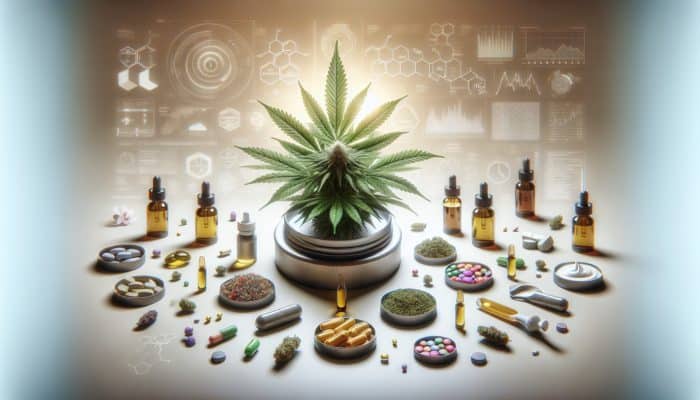Discover the Transformative Benefits of CBD Supplements for Accelerated Recovery
Understanding CBD Supplements: Their Composition and Mechanism of Action

CBD supplements are innovative health products enriched with cannabidiol (CBD), a beneficial compound sourced from cannabis plants. These supplements are becoming increasingly popular due to their potential health benefits, particularly for those facing both physical and mental recovery challenges. Available in numerous forms—such as oils, capsules, edibles, and topicals—each type is tailored to address specific recovery needs and objectives. The common forms of CBD supplements encompass:
- CBD oils and tinctures that facilitate swift absorption
- CBD capsules and softgels for user convenience
- CBD edibles like gummies and chocolates, providing a delicious alternative
- CBD topicals such as creams and balms aimed at specific areas for relief
- CBD vape products designed for immediate effects
- CBD isolates offering pure CBD powder for tailored usage
As understanding of cannabis and its myriad components expands, integrating CBD supplements into global health and wellness practices is rapidly becoming the norm. Athletes and health enthusiasts are increasingly recognising these supplements as essential tools to amplify their recovery efforts.
Maximise Your Recovery Process with CBD Supplements
Utilising CBD supplements can greatly enhance your recovery by engaging with the body’s endocannabinoid system (ECS), a critical network responsible for regulating numerous physiological functions, including pain perception, inflammation control, and mood stability. By influencing these vital functions, CBD supplements may help create a more effective and enjoyable recovery experience. The primary recovery advantages include:
- Reducing inflammation to promote faster healing
- Providing pain relief to enhance overall comfort
- Improving sleep quality to facilitate better regeneration
- Boosting mood and alleviating anxiety levels
- Supporting muscle relaxation to reduce tension
The ability of CBD to address inflammation is particularly beneficial for athletes engaged in rigorous training, as unregulated inflammation can significantly impede recovery and prolong muscle soreness. Furthermore, CBD’s potential pain-relieving properties empower individuals to resume their activities with reduced discomfort and quicker recovery times.
Assessing the Safety of Daily CBD Supplement Use
The safety profile of CBD supplements for regular use largely hinges on factors such as product quality, dosage, and individual health considerations. Generally, CBD is well-tolerated by most individuals; however, some may experience side effects. Common side effects include dry mouth, dizziness, and variations in appetite. It’s crucial for individuals to approach CBD supplementation thoughtfully, especially if they have pre-existing health conditions or are taking medications. Consulting a healthcare professional prior to initiating any CBD regimen is highly advisable. Key safety practices to consider include:
- Starting with a low dosage to assess individual tolerance
- Monitoring for adverse effects to ensure ongoing safety
- Avoiding interactions with particular medications
- Selecting high-quality products verified through third-party testing
Being informed about these considerations empowers individuals to make knowledgeable decisions regarding the integration of CBD supplements into their recovery regimens.
Professional Insights on CBD Supplements for Enhanced Recovery

Expert Perspectives on the Efficacy of CBD Supplements
Professionals in the health and wellness industry frequently underscore the potential advantages and limitations of CBD supplements in recovery scenarios. While anecdotal evidence supporting CBD’s benefits is persuasive, many experts stress the necessity for more rigorous clinical trials to comprehensively understand its efficacy. Notably, esteemed sports nutritionists advocate for CBD as a valuable asset for athletes seeking to diminish post-exercise inflammation and encourage rapid recovery. They assert that CBD’s anti-inflammatory properties can be particularly beneficial in high-performance sports, where swift muscle recovery is crucial. Testimonials from athletes indicate enhanced recovery times and reduced pain after incorporating CBD into their routines. Nonetheless, experts advise caution, as individual responses to CBD can differ widely, highlighting the importance of customized usage strategies.
Selecting the Ideal CBD Supplement to Suit Your Recovery Needs
Choosing the right CBD supplement involves assessing several critical factors to optimize its benefits. First, identify the type of CBD product that aligns best with your recovery objectives. For example, oils offer rapid absorption, while edibles provide longer-lasting effects. Next, scrutinise the CBD concentration; higher concentrations may be advantageous for severe recovery needs but should be approached with caution. Additionally, consider any specific health conditions or sensitivities that may influence your choice of CBD type (such as full-spectrum versus isolate). Actionable steps for making an informed selection include:
- Clarifying your recovery goals to direct your choices
- Researching reputable brands with third-party testing
- Reading reviews and customer testimonials for insights on effectiveness
- Experimenting with different forms of CBD to determine what works best for you
By adhering to these guidelines, individuals can make well-informed decisions that enrich their unique recovery experiences.
Current Research Findings on CBD Supplements and Recovery Benefits

A substantial body of research has investigated the recovery-related effects of CBD, revealing its potential benefits across various domains. Studies suggest that CBD can effectively reduce muscle soreness and inflammation, providing athletes with a crucial advantage during recovery phases. Recent findings also indicate that CBD positively influences sleep patterns, an essential component of effective recovery. Experts reviewing these studies consistently underline the importance of larger, randomized controlled trials to fully substantiate these claims. Continued research is imperative for elucidating the mechanisms through which CBD operates and for developing comprehensive guidelines on its incorporation into recovery protocols.
Key Benefits of Integrating CBD Supplements into Your Recovery Regimen
What Significant Advantages Can CBD Supplements Offer?
CBD supplements present a wide array of significant benefits that can substantially enhance recovery processes. They are increasingly acknowledged for their capacity to alleviate pain, reduce inflammation, and improve overall sleep quality. These benefits are particularly vital for anyone endeavouring to recover effectively after physical exertion or injuries. The primary recovery benefits encompass:
- Relief from pain and discomfort to enhance quality of life
- Reduction in muscle soreness for accelerated recovery
- Enhancement of sleep quality and duration for better rest
- Support for mental well-being and effective stress management
- Potential improvement in overall physical performance through expedited recovery
The comprehensive nature of these benefits positions CBD as a highly adaptable option, suitable for a diverse range of individuals, from elite athletes to casual fitness enthusiasts. By incorporating CBD supplements into a recovery strategy, users can experience improved performance and a swifter return to peak physical condition.
Enhancing Sleep Quality with CBD Supplements
CBD supplements have demonstrated potential in enhancing sleep quality by addressing underlying issues such as anxiety and stress, which can disrupt restful sleep patterns. By promoting relaxation and soothing the nervous system, CBD enables individuals to achieve deeper, more restorative sleep cycles. The connection between sleep and recovery is particularly critical; without adequate rest, the body struggles to heal and rejuvenate effectively. Research indicates that improved sleep can lead to better muscle recovery, enhanced cognitive function, and a more positive overall mood. Understanding how CBD contributes to improved sleep opens the door to effectively utilising these supplements to optimise recovery outcomes.
Managing Inflammation with CBD Supplements
One of CBD’s most significant advantages lies in its anti-inflammatory properties, which can be transformative for individuals recovering from physical stress or injuries. While inflammation is a natural response to injury, chronic inflammation can impede recovery. CBD’s interaction with the endocannabinoid system plays a vital role in regulating inflammation throughout the body. Scientific studies have confirmed that CBD can lower inflammation markers, facilitating quicker healing and recovery. This capacity to modulate inflammatory responses positions CBD supplements as crucial allies for athletes and active individuals aiming to enhance their recovery timelines.
Effective Pain Relief Through CBD Supplements
CBD supplements can effectively alleviate pain by interacting with the body’s endocannabinoid system, which governs pain perception. When introduced into the body, CBD may help block pain signals and diminish the perception of discomfort. This is especially beneficial for individuals recovering from injuries or engaging in intense physical activities. Research indicates that CBD’s analgesic properties can alleviate various pain types, including chronic pain, neuropathic pain, and muscle soreness. By managing pain effectively, CBD empowers individuals to re-engage in physical activities sooner, thus accelerating the overall recovery process.
Proven Strategies for Effectively Incorporating CBD Supplements into Your Recovery Plan
What Is the Optimal Method for Consuming CBD Supplements?
The best method for taking CBD supplements can vary according to individual preferences and specific recovery needs. Popular formats include oils, capsules, edibles, and topicals. CBD oils and tinctures offer rapid absorption and flexible dosing, making them ideal for immediate relief. Capsules and softgels provide controlled dosages and are convenient for those with active lifestyles. Edibles, such as gummies, are user-friendly and offer longer-lasting effects, while topicals excel at delivering targeted relief for sore areas. Each method offers unique benefits, and individuals may find that a combination of these forms yields the best results for their recovery routines.
Determining the Right CBD Dosage for Optimal Recovery
Finding the appropriate dosage of CBD for recovery can be a nuanced process, as it often depends on personal needs and body chemistry. A general guideline is to start with a low dosage, typically between 5 to 10 mg, and gradually increase based on the observed effects. It’s essential to pay attention to how your body responds to CBD, as some individuals may require higher doses to achieve the desired outcomes. Consulting with a healthcare professional or a knowledgeable source before commencing a CBD regimen is crucial to ensure both safety and efficacy. Monitoring your response will help pinpoint the optimal dosage for your recovery.
Timing Your CBD Supplement Intake for Maximum Effectiveness
The timing of CBD supplement consumption can significantly impact its effectiveness, particularly concerning recovery. Many experts recommend taking CBD supplements before bedtime to enhance sleep quality, thereby supporting optimal recovery overnight. Additionally, using CBD after workouts can help manage post-exercise inflammation and pain, improving recovery efficiency. For those recovering from specific injuries, timing CBD doses around activities that may exacerbate discomfort can also be advantageous. Understanding the ideal timing for CBD use can maximise its potential benefits for recovery.
Identifying Potential Side Effects of CBD Supplements in Recovery
Common Side Effects Associated with CBD Supplement Use
While CBD is generally regarded as safe, certain individuals may experience side effects. Common side effects encompass dry mouth, dizziness, fluctuations in appetite, and fatigue. These side effects can vary in intensity and duration among users. Managing these side effects often involves adjusting the dosage or the method of consumption. Staying hydrated and consuming CBD with food can also alleviate some digestive-related side effects. Being aware of these potential reactions empowers users to make informed choices regarding their CBD supplement use, ensuring a safer experience.
Potential Interactions Between CBD Supplements and Other Medications
CBD has the potential to interact with certain medications, which may influence their effectiveness or lead to adverse reactions. Some medications are metabolised by the same liver enzymes as CBD, possibly altering their efficacy. Common medications that might interact with CBD include blood thinners, anti-seizure medications, and specific antidepressants. It is crucial for individuals on medication to consult with a healthcare provider before integrating CBD into their routine. This precaution helps ensure that users can safely benefit from CBD without compromising their overall health or medication effectiveness.
Long-Term Risks Associated with CBD Supplement Use
Although CBD is widely considered safe for many users, ongoing research into its long-term effects continues to raise concerns. Notably, issues related to liver health have been highlighted, particularly at elevated doses. Furthermore, there are inquiries into potential dependency issues, although current evidence suggests that CBD is non-addictive. Users should be mindful of their consumption patterns and consult healthcare professionals if they have concerns about long-term use. Staying informed and vigilant can help individuals enjoy the benefits of CBD supplements while minimizing potential risks.
Scientific Insights into the Benefits of CBD Supplements for Recovery
Evidence from Research on CBD and Pain Relief
Research indicates that CBD can significantly alleviate various types of pain, establishing it as a valuable resource for recovery. Clinical studies have demonstrated that CBD effectively manages chronic pain, muscle soreness, and neuropathic pain. For instance, a study published in the Journal of Experimental Medicine found that CBD reduced inflammation and pain in animal models, paving the way for further investigation in human subjects. Experts underscore the necessity for ongoing research to uncover the full extent of CBD’s analgesic properties and how they can be effectively integrated into recovery strategies.
The Role of CBD in Mental Recovery
The potential benefits of CBD extend beyond physical recovery; it plays a pivotal role in mental recovery as well. By mitigating anxiety and stress levels, CBD can assist individuals in achieving a more balanced mental state, which is essential for effective recovery. Mental resilience is particularly important for athletes and active individuals, as psychological barriers can significantly hinder performance and recovery. Numerous real-world accounts exist of individuals successfully incorporating CBD into their mental health routines, reporting reduced anxiety and improved focus during high-pressure situations.
Enhancing Physical Recovery Through CBD Supplements
Research suggests that CBD supplements can enhance physical recovery by reducing inflammation and improving overall muscle functionality. For athletes, this translates to decreased downtime due to soreness and quicker returns to training schedules. The anti-inflammatory properties of CBD can help alleviate muscle damage often associated with intense workouts, facilitating faster recovery. Practical strategies for incorporating CBD into physical recovery include using it in post-workout routines, applying topical forms on sore areas, and ensuring regular usage to experience long-term benefits.
Guidelines for Selecting the Most Effective CBD Supplements for Recovery
Critical Factors to Consider When Choosing a CBD Supplement
When selecting a CBD supplement, several critical factors must be assessed to ensure both quality and efficacy. Seek products that are transparent about their sourcing and manufacturing practices. High-quality CBD supplements should originate from organically grown hemp and undergo thorough third-party testing to confirm their potency and purity. Ensure clear labeling that indicates the concentration of CBD and the type utilised, whether full-spectrum, broad-spectrum, or isolate. Consulting knowledgeable retailers or healthcare professionals can further assist in making informed decisions.
Ensuring the Quality of CBD Supplements
To guarantee the quality of CBD supplements, check for third-party lab results and certifications. Reputable brands provide Certificates of Analysis (COAs) outlining the cannabinoid profile and any contaminants. Understanding how to interpret these lab reports is vital; look for evidence indicating that the product contains the stated amount of CBD and is free from harmful substances like heavy metals or pesticides. Additionally, reviewing customer feedback and seeking recommendations from trusted sources can help validate the quality and efficacy of a product.
Varieties of CBD Products Available for Recovery
Indeed, a variety of CBD types are available, including full-spectrum, broad-spectrum, and isolates, each offering unique characteristics and potential recovery benefits. Full-spectrum CBD contains all cannabinoids and terpenes found in the cannabis plant, which may enhance its therapeutic effects through the entourage effect. Broad-spectrum CBD includes multiple cannabinoids, excluding THC, making it suitable for those wishing to avoid psychoactive effects. CBD isolates provide pure CBD, free of additional compounds, making them ideal for individuals seeking targeted benefits without other cannabinoids. Understanding these distinctions is crucial for selecting the most suitable product for recovery.
Facilitating Recovery Efforts with CBD Supplements
CBD supplements support recovery by decreasing inflammation, relieving pain, and promoting improved sleep quality. Their interaction with the endocannabinoid system enables the modulation of these physiological processes, leading to a more effective recovery experience. This holistic approach to recovery positions CBD supplements as an attractive option for individuals striving to enhance both their physical and mental well-being. By integrating CBD into their recovery regimens, users can achieve better outcomes and a more rapid return to optimal performance levels.
Strategies for Maximising the Benefits of CBD Supplements in Recovery
Enhancing the Effects of CBD Supplements
Maximising the effects of CBD supplements can be achieved by incorporating complementary recovery practices into your routine. Regular physical activity, a balanced diet rich in essential nutrients, and adequate hydration can significantly enhance the benefits of CBD. Furthermore, engaging in stress management techniques such as yoga, meditation, or deep-breathing exercises can create a synergistic effect with CBD’s calming properties. Consistency in CBD use, combined with these lifestyle changes, can lead to substantial improvements in recovery outcomes.
Complementary Lifestyle Changes to Support CBD Supplement Use
Implementing lifestyle adjustments that harmonise with CBD supplement use can foster a holistic approach to recovery. Engaging in regular exercise, consuming a nutritious diet, and ensuring sufficient sleep are foundational elements that enhance overall well-being. Incorporating mindfulness practices or stress-reduction techniques can further amplify the effects of CBD, as mental health plays a crucial role in physical recovery. By adopting these complementary lifestyle changes, individuals can optimise their recovery experience and improve their overall quality of life.
Expected Timeline for Observing Results from CBD Supplements
The timeline for noticing the effects of CBD supplements can vary significantly among individuals, typically ranging from a few days to several weeks. Factors influencing this timeframe include dosage, method of consumption, and individual body chemistry. For some, noticeable effects may manifest immediately, particularly with fast-acting forms like oils, while others may require consistent use over time to realise cumulative benefits. Monitoring personal responses and adjusting usage based on experiences can facilitate the identification of the most effective regimen.
Best Practices for Dosing CBD Supplements
Optimal dosing practices for CBD supplements involve starting with a low dose and gradually increasing it based on individual tolerance and response. It is advisable to begin with the lowest available dosage, observing the effects over several days before making adjustments. Keeping a journal to document symptoms and effects can be beneficial in identifying the optimal dosage for recovery. Consulting with healthcare professionals can also provide personalised guidance, ensuring a safe and effective CBD supplementation experience.
Frequently Asked Questions About CBD Supplements
What Are CBD Supplements and Their Purpose?
CBD supplements are wellness products that contain cannabidiol, a non-psychoactive compound derived from cannabis, used to enhance health and support recovery.
How Can CBD Supplements Facilitate Recovery?
CBD supplements interact with the endocannabinoid system, potentially alleviating pain, minimising inflammation, and reducing anxiety, all of which are crucial for recovery.
Are CBD Supplements Safe for Long-Term Use?
CBD supplements are generally safe; however, they may cause side effects. Consulting a healthcare professional before regular use is essential for safety.
What Formats Are Available for CBD Supplements?
CBD supplements come in various forms, including oils, capsules, edibles, and topicals, each catering to different user needs and preferences.
How Much CBD Should Be Taken for Recovery?
Dosage varies for each individual; it is advisable to start low and gradually increase based on personal effects to optimise recovery.
Can CBD Supplements Help Improve Sleep?
Yes, CBD may enhance sleep quality by alleviating anxiety and promoting relaxation, both of which are critical for effective recovery.
What Side Effects Can Be Associated with CBD Supplements?
Common side effects may include dry mouth, dizziness, and changes in appetite, which can often be managed by adjusting dosage or method of consumption.
Do CBD Supplements Interact with Other Drugs?
Yes, CBD may interact with certain medications, potentially affecting their effectiveness. Consulting a healthcare provider is advised to ensure safe use.
What Types of CBD Products Are Available for Recovery?
CBD products include full-spectrum, broad-spectrum, and isolates, each possessing unique characteristics that may aid recovery in different ways.
How Can I Verify the Quality of CBD Supplements?
Review third-party lab results and certifications to ensure the quality and safety of CBD supplements before purchasing.
Connect with us on Facebook!
The Article CBD supplements for recovery: A Comprehensive Guide appeared first on https://athleticsupplement.com
The Article CBD Supplements for Recovery: Your Essential Guide Was Found On https://limitsofstrategy.com



